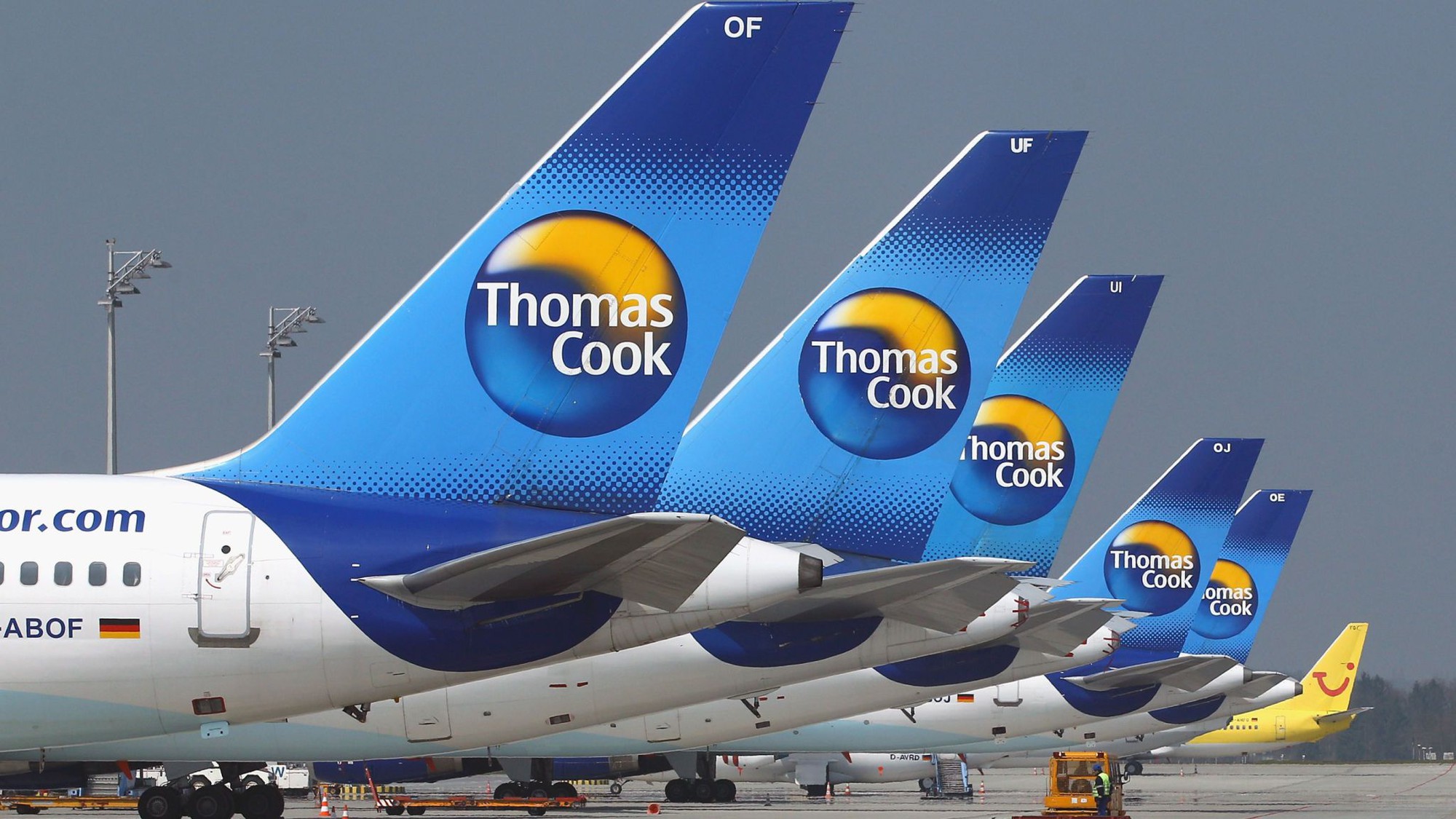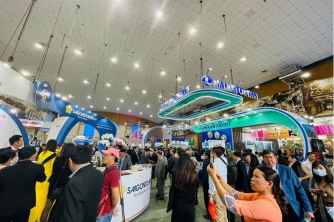In Asia, especially in Southeast Asia, Thomas Cook Travel Group (UK) is not a familiar name, except for people in the profession.
With the small number of visitors to Vietnam, their collapse did not leave a legacy. But the story around Thomas Cook is interesting lessons for tourism.
"Thomas went bankrupt leaving 150,000 guests stuck abroad," "Thomas Cook asked for government assistance," "Tunisia hotels are asking guests to pay directly."
The headlines of the famous media such as BBC, The Guardian stir up the European tourism market. With a reputation of hundreds of years, Thomas Cook's stumbling block was a big shock.

Aviation - Is the game too far?
A few decades ago, there were two opposite movements in the world. On the first afternoon, airlines, under competitive pressure and wishing to take advantage of their giant passenger fleet, established a travel division, providing additional essential services such as accommodation and transportation. . These include Virgin Holidays, Qantas Holidays, Emirates Holidays.
In the opposite direction, large travel agencies, with the dream of taking control of the game and improving business efficiency, investing in the establishment of an airline not small: TUIfly, Jet2 and can not fail to mention. Thomas Cook.
While the trend has cooled down, in Vietnam, an emerging market, this trend has started to explode. In 2019 alone, there are 4 airlines aggressively campaigning for flight permits, half of which come from travel companies, such as Vietravel Airlines and Kite Air of Kites Air Travel Joint Stock Company. Thien Minh.
The game of aviation has never been this easy. According to the 2018 financial report, Thomas Cook Airlines has a profit ratio of EBIT margin of 3.7%, much lower than the common ground of Europe (6.2%) and the world. (5.8%).
The travel business, though with nearly £ 7.4 billion in sales, has an even worse EBIT margin of 2.2%, despite a gross margin of 13.5%. It can be seen that the administrative expenses or financial expenses are too large and probably out of control.
In a plan to diversify its industry, Vietravel, a leading company in both outbound (inbound) and inbound (inbound) travelers, has established its own airline. With charter and night options, the company is trying to avoid confrontation with the big guys.
But no matter what happens, the top 3 airlines in Vietnam - Vietnam Airlines, Vietjet and Bamboo Airways - will probably not be willing to welcome new players. Vietravel, as a tour organizer, will be a gold partner of the airlines. With a large number of passengers, they are in a position to force airline tickets to very low levels.
For their part, in the business problem, airlines are willing to sell a fairly cheap amount of tickets, even at cost to reach break-even point or reduce losses during off-peak flight hours. But the story will be completely different from Vietravel Airlines, whether they like it or not. Not to mention the selection of the base is Phu Bai (Hue) airport while the key domestic market is located in Saigon and Hanoi, and the destination Hue is not too outstanding for domestic and foreign tourists. is the next difficulty for them.
Vietravel's travel business statistics are worse than Thomas Cook. With 2018 sales of VND 6,667 billion, the company only achieved 397 billion gross profit (equivalent to less than 6%) and the next EBIT margin was only 0.9%.
This is a worrying figure for future investment activities, especially aviation - a risky field.
Although Vietravel Airlines law is an independent legal entity, it is highly likely that the parent company will use the guarantee revenue advantages for its subsidiary, in which the guarantee of loans by cash flow in the future. or business contracts are a prime example. Bamboo Airways in the first 3 months saw a loss of over 300 billion dong. Kite Air has an estimated loss of over VND 350 billion. Vietravel Airlines mobilizes VND 700 billion with a bond term of only 24 months, which means that after 24 months all the capital must be repaid to bondholders.
Without a suitable next capital mobilization plan or a strong financial organization behind it, Vietravel Airlines will face a very tense cash flow problem. Kite Air is also not a brighter case.
Although there are no publicly available financial statements (as a non-public joint stock company), this company only has an outstanding history in the field of inbound tourism (domestic) and does not have much experience and advantages of domestic customers file such as Vietravel.
New tourist trends
The Internet is a great invention of man and in the travel industry with non-tangible products, its influence is superlative. Thanks to the Internet, people are closer together, mysteriously distant lands become closer and familiar after just a few clicks.
>>> 8 Best Travel Marketing Trends in the digital era
This has stimulated the hidden needs of tourists: experiencing and exploring for themselves. The Internet has helped the travel industry boom, but on the other hand has indirectly killed many traditional travel business models in the past, of which Thomas Cook is a typical victim.
Airbnb, the world's leading family room sharing site for travelers, after dominating the share-sharing market, 2016 introduced a new concept: experience sharing.
Imagine you are a foodie and when traveling to Paris, you book a room through Airbnb and stay with the host as a chef, experience street food with the owner - a local expert . That would be a great emotion that few travel companies can provide.
After a decade of struggling with losing customers to the giants that sell airline tickets and sell rooms online like Expedia, Booking, Agoda, travel services, the last piece of land is small but still fertile, continue to be violated.
If customers buy tickets directly from the airline or through famous online ticketing channels, they can book taxis through dozens of apps on Android and Apple at the airport, stay and hang around the city with the host. A big question arises: what do travel companies exist for? This is a direct hit across the tour organizers. In Vietnam, fortunately the package tour product still has land using martial arts, at least in 5-10 years. Tourists in Vietnam, partly limited by the ability to use foreign languages, partly afraid of strange lands, have the psychology of group gatherings, they will still choose the tour packages for their trip.
Thomas Cook, with a highly independent European tourist line, was not so lucky. Having endured for many years under the pressure of new business models, they were unable to change to follow the trend.
Website system and online sales are outdated, not updated with new technology trends, do not manage and share customer data sources with each other; Maintain a chain of retail offices in the busiest streets with expensive operating costs and sparse visitor numbers.
These have eroded profits, already quite thin in the travel industry. This is, worryingly, the path many Vietnamese travel companies choose. Press releases of major travel companies always list the number of newly established offices, the size of the recruiting staff, and rarely mention the technological achievements.
The website of many companies is just a channel to promote products and share information, rather than an online communication channel with the right customers. Travel.com.vn, introducing itself as Vietnam's largest travel site, focuses on pure package tours. Their tripu.vn reservation business, launched just last year, is still an agent and uses Expedia data for booking.
Ivivu, the TMGvel's online tour and service website, which is working with Vietravel to obtain an aviation license, seems to be getting better. They already have the app on the Google Play Store and the Apple App Store, despite just over 10,000 downloads. Vntrip - a company that considers itself to be OTA (online travel agency), established for 6 years - is still slow with its progress despite having several successful venture capital calls, raising the company's value to 50 million USD.
Their website maintains a unique index of hotel rooms and still targets Vietnamese customers only.
Ctrip, China's largest online travel company, started a business in 2009 and has remained faithful to its technology path. Their model is very successful with 2018 revenue of 4.5 billion USD.
Despite having a surplus of billions of dollars after the initial public offering (IPO), Ctrip's extensive portfolio focused on technology companies such as makemytrip of India and skyscanner of Ireland. Completely absent of tourism properties such as hotels, resorts or yachts or airlines. Their platform is world-class with the creation of a marketplace for thousands of suppliers, including local Chinese partners and foreign companies, competing on an equal playing field.
The bankruptcy of a travel company or airline, because of weakness or wrong policy, is very normal in a market economy. With a young industry history, Vietnam has not witnessed a large-scale tourism company go bankrupt, and so has never had a case to handle this. The 2017 Travel Law states that travel is a conditional business, and outbound / inbound tour operators require a deposit of VND 500 million / 250 million in banks.
With over 2,000 international travel licenses issued, this will be a significant financial source. There is practically no specific instruction on how to use this money for a risk. The good news is that the Law on Tourism has very clear rules that force travel companies to buy insurance for their guests when traveling abroad.
Prestigious travel companies include this premium in the price offered to customers. With a maximum compensation of 10,000 - 100,000 USD depending on the destination, this compulsory insurance policy is a very useful tool to protect tourists.
The writer of this article is always eager and enthusiastically support the idea of dare to think dare to do of the seniors in the profession. If everyone is afraid, how could the big sea contest? But imagine a Vietnamese travel company or medium-sized airline declared bankrupt while several tens of thousands of tourists were stuck abroad.
This is not only a story about money or compensation, but it will be a slight crisis in organizing to bring citizens safely home, especially the application of Vietnam's laws is also somewhat loose and poor synchronization.
Please keep in mind and always think that one day you will be big, and Vietnam will be in the top countries sending tourists abroad. A good scenario ready to deal with possible future risks is something managers should begin to consider.
Interestingly, our neighbor, the country of China with 150 million tourists travel abroad each year, has no airline under the ownership of tour operators, regardless of the size of the service. a million visitors a year.
Chonqing, CYTS, GZL, Shanghai Spring are well-known companies that are chartering daily flights to bring passengers from Chongqing, Chengdu, Shanghai to Vietnam. Most are chartered aircraft from domestic airlines.
A little further north, Japan has nearly 19 million outbound visitors each year but JTB, the country's largest travel company, remains faithful to its traditional travel business. Their extensive portfolio is focused only on travel agencies, or regional destination management companies. Within ASEAN, Indonesia is making great progress with the appearance of "unicorns" - Unicom, unlisted companies valued at over US $ 1 billion.
Traveloka is one of them. With a young age, in 7 years the company has been able to expand to other countries in the bloc and diversify product files from air tickets, hotels, package tours to small services such as airport taxis, watching shows.
In Vietnam, Traveloka, Klook, and other big names in the region, are strongly attacking the domestic market, where we have absolutely no company worthy to compete.
TTO





